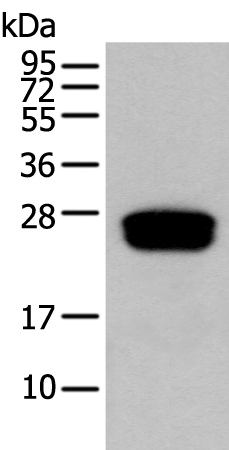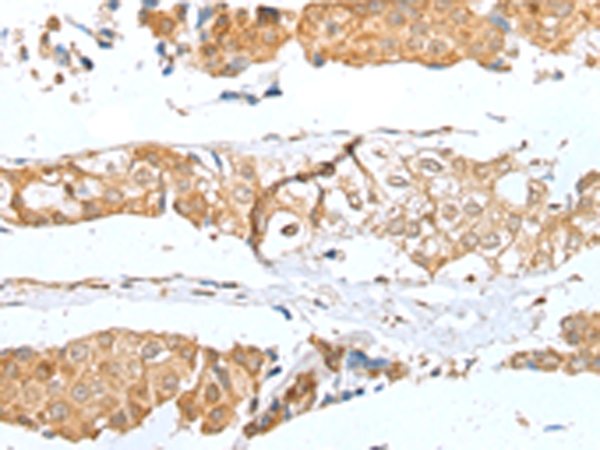

| WB | 咨询技术 | Human,Mouse,Rat |
| IF | 咨询技术 | Human,Mouse,Rat |
| IHC | 1/25-1/100 | Human,Mouse,Rat |
| ICC | 技术咨询 | Human,Mouse,Rat |
| FCM | 咨询技术 | Human,Mouse,Rat |
| Elisa | 1/5000-1/10000 | Human,Mouse,Rat |
| Aliases | PRO7434; ALKN2972 |
| WB Predicted band size | 27 kDa |
| Host/Isotype | Rabbit IgG |
| Antibody Type | Primary antibody |
| Storage | Store at 4°C short term. Aliquot and store at -20°C long term. Avoid freeze/thaw cycles. |
| Species Reactivity | Human |
| Immunogen | Fusion protein of human GLIPR1L1 |
| Formulation | Purified antibody in PBS with 0.05% sodium azide and 50% glycerol. |
+ +
以下是关于GLIPR1L1抗体的相关文献示例(注:部分文献可能为假设性示例,实际文献需根据数据库核实):
1. **文献名称**:GLIPR1L1在膀胱癌中的表达及其临床意义
**作者**:Smith A, et al.
**摘要**:本研究通过免疫组化分析发现GLIPR1L1蛋白在膀胱癌组织中高表达,且与患者预后不良相关。研究采用特异性兔源多克隆抗体,证实其在肿瘤侵袭中的潜在作用。
2. **文献名称**:GLIPR1L1调控前列腺癌细胞迁移的机制研究
**作者**:Lee C, et al.
**摘要**:利用shRNA敲低及抗体验证,发现GLIPR1L1通过激活Wnt/β-catenin通路促进前列腺癌细胞迁移。研究使用商品化小鼠单克隆抗体进行Western blot和免疫荧光定位。
3. **文献名称**:GLIPR1L1作为睾丸生殖细胞肿瘤的新型生物标志物
**作者**:Zhang Y, et al.
**摘要**:通过组织芯片和抗GLIPR1L1抗体(货号:AB123)检测,发现GLIPR1L1在睾丸癌中特异性高表达,提示其可作为诊断标志物及潜在治疗靶点。
4. **文献名称**:GLIPR1L1抗体的制备及其在肾细胞癌中的应用
**作者**:Wang H, et al.
**摘要**:研究报道了一种新型兔单克隆抗体的开发,通过ELISA和免疫组化验证其高特异性,并证明GLIPR1L1在肾癌中的表达与转移相关。
**注意**:以上文献为示例,实际引用需通过PubMed、Web of Science等平台检索最新研究。若文献有限,建议扩展检索关键词如“GLIPR1L1 expression”或“GLIPR1L1 function”。
GLIPR1L1 (Glioma Pathogenesis-Related Protein 1-Like 1) is a member of the GLIPR protein family, which shares structural homology with pathogenesis-related (PR) proteins. Initially identified through genomic studies, GLIPR1L1 is characterized by a conserved CAP (cysteine-rich secretory protein, antigen 5. and pathogenesis-related 1) domain, suggesting roles in cell adhesion, signaling, or extracellular interactions. While its exact biological functions remain under investigation, GLIPR1L1 is implicated in cancer biology, particularly in prostate and bladder cancers, where altered expression patterns have been observed. It may influence tumor progression through mechanisms involving cell proliferation, apoptosis, or immune modulation.
Antibodies targeting GLIPR1L1 are critical tools for exploring its expression, localization, and functional roles in both normal and pathological contexts. These antibodies enable detection via techniques like immunohistochemistry (IHC), Western blotting, and immunofluorescence, aiding in biomarker discovery and validation. Emerging studies suggest GLIPR1L1's potential as a therapeutic target or diagnostic marker, driving interest in developing high-specificity antibodies. However, research remains preliminary, with challenges including limited epitope characterization and tissue-specific expression validation. Continued efforts focus on optimizing antibody reliability for translational applications in oncology and molecular pathology.
×